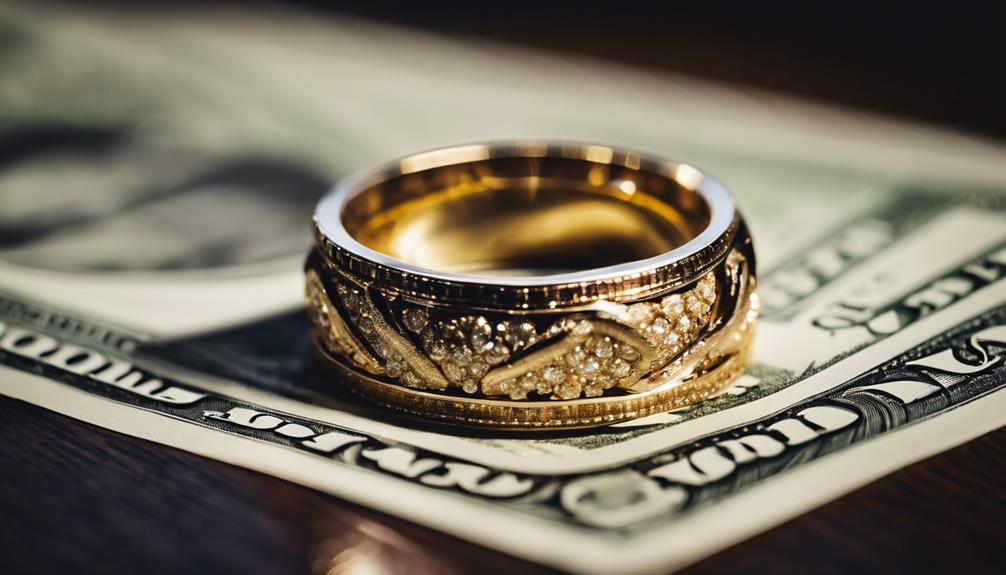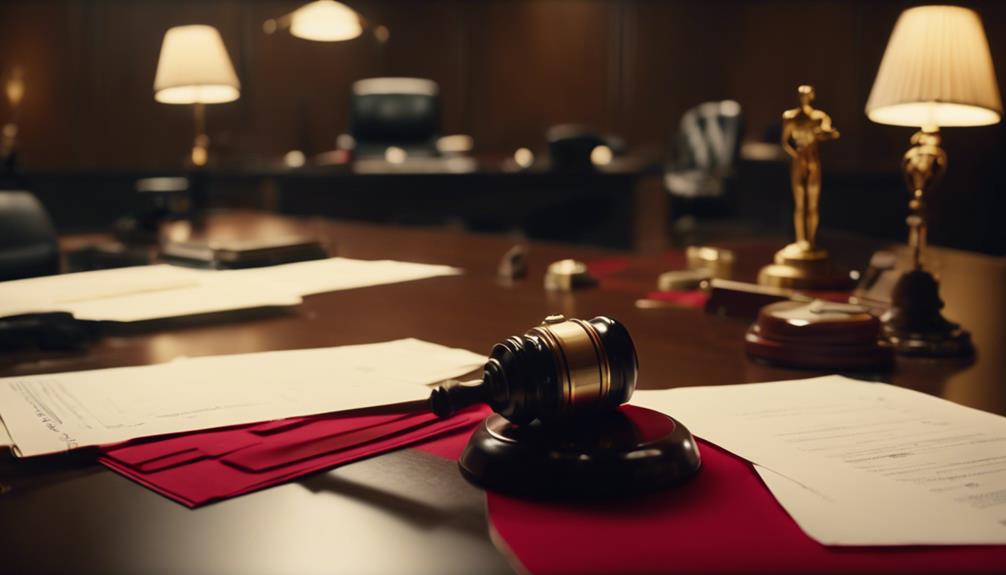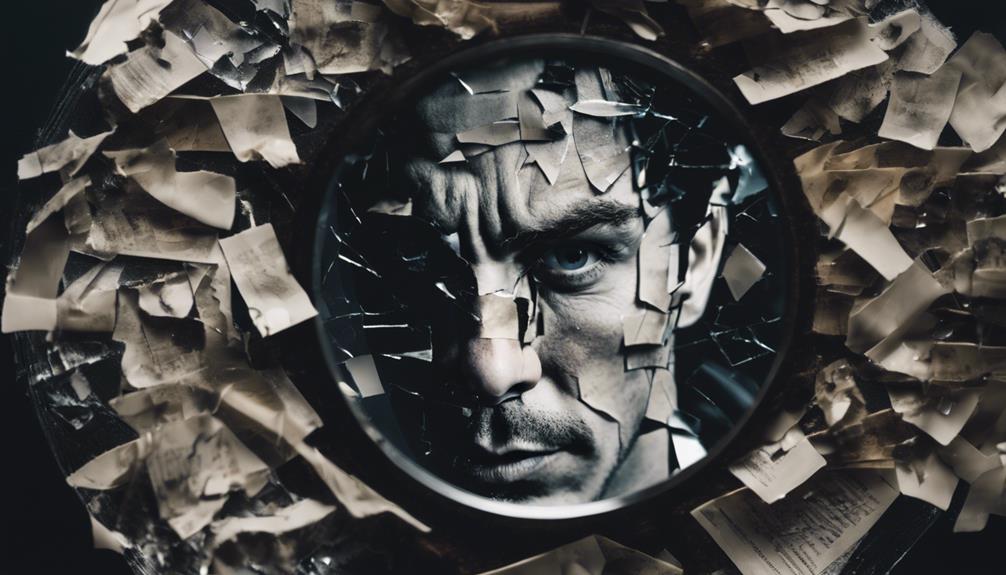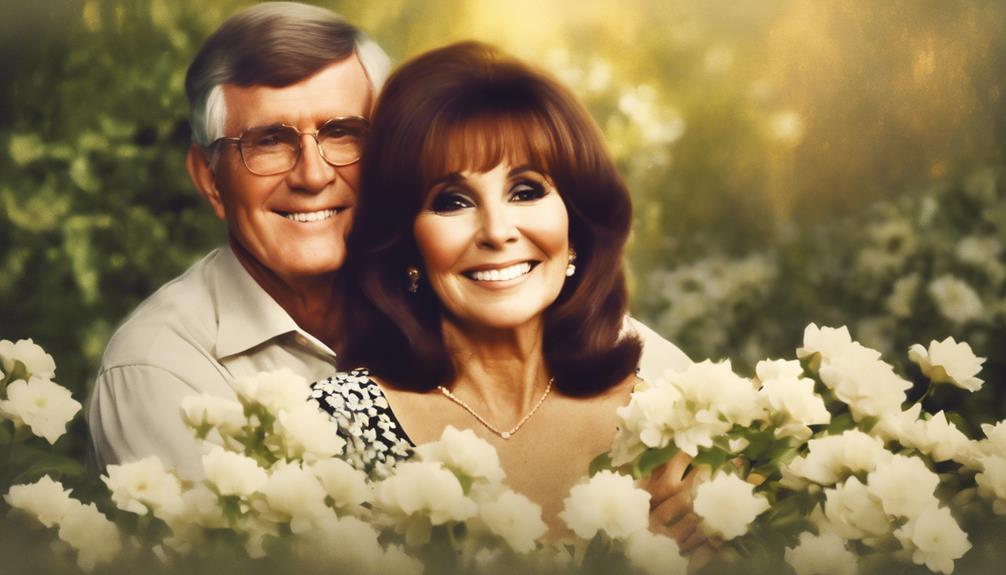When celebrities divorce, the financial stakes are staggering, with settlements reaching billions of dollars. Mackenzie Bezos received around $36 billion in her divorce from Jeff Bezos, while Juanita Jordan received a $168 million payout in her divorce from Michael Jordan. Dr. Dre agreed to pay Nicole Young $100 million in their divorce. Celebrities use complex financial structures, trusts, and shell companies to conceal assets, and forensic accounting is often necessary to uncover hidden assets. As they navigate the financial negotiations of divorce, understanding the complexities of asset division, business valuation, and postnuptial agreements is vital. As the battle for assets unfolds, one thing is clear: the stakes are high, and the drama is just beginning.
Key Takeaways
• Celebrity divorces often involve complex financial negotiations, with settlements reaching billions of dollars, as seen in Jeff Bezos' $36 billion payout.
• Hiding assets in secret accounts, trusts, and shell companies is a common tactic, requiring forensic accounting to uncover concealed wealth.
• Valuing and dividing business interests fairly requires expert evaluation of revenue streams, assets, and liabilities, considering each party's goals and industry standards.
• High-net-worth individuals can protect their assets with postnuptial agreements, trusts, and separate accounts, ensuring financial independence and security.
• Navigating complex financial assets, including investment portfolios and intellectual property rights, requires expert evaluation to ensure a fair divorce settlement.
Celebrity Divorce Settlements Exposed
When it comes to celebrity divorces, the financial settlements often grab headlines, with some of the wealthiest individuals in the world parting with staggering sums of money to finalize their separations.
The process of asset division and financial negotiations can be complex and contentious, with both parties fighting for their fair share. In some cases, the divorce settlement can be staggering, as seen in the case of Mackenzie Bezos, who received around $36 billion in her divorce from Jeff Bezos.
Similarly, Juanita Jordan received a $168 million payout in her divorce from Michael Jordan, one of the largest settlements in history. Dr. Dre agreed to pay Nicole Young $100 million in their divorce settlement, with two installments of $50 million each.
These figures demonstrate the high stakes involved in celebrity divorces, where the financial negotiations can be intense and the outcome can be life-changing.
Most Expensive Divorces in History
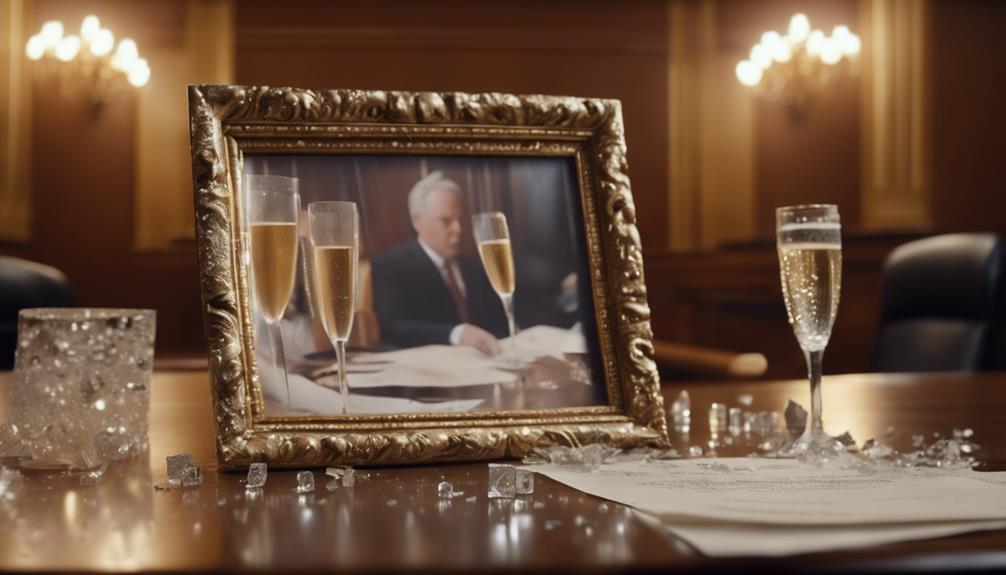
When it comes to the most expensive divorces in history, the numbers are staggering. With payouts reaching into the billions, these high-profile splits have made headlines and broken records.
From Jeff Bezos' $36 billion settlement to Rupert Murdoch's $1.7 billion agreement, these costly divorces are a reflection of the high stakes of celebrity marital splits.
Biggest Payouts Ever Made
Among the most notable celebrity divorces, a handful stand out for their staggering price tags, with some settlements reaching into the billions of dollars. These financial negotiations have led to some of the biggest payouts ever made in celebrity divorces.
The most expensive divorce in history was between Jeff and Mackenzie Bezos, with Mackenzie receiving around $36 billion in the settlement. Juanita Jordan received a $168 million payout from Michael Jordan, making it one of the biggest divorce settlements ever. Dr. Dre agreed to pay Nicole Young $100 million in their divorce, with two installments of $50 million each.
Other notable examples include Cindy Silva receiving an $80 million settlement from Kevin Costner after their 18-year marriage ended without a prenup, and Paul McCartney's divorce from Heather Mills costing him nearly $50 million. These expensive settlements demonstrate the high stakes involved in celebrity divorces, where financial negotiations can lead to massive payouts.
Celeb Divorce Settlements Revealed
Mackenzie Bezos's record-breaking $36 billion divorce settlement with Jeff Bezos leads the pack of costly celebrity divorces, a demonstration of the massive financial stakes involved in high-net-worth separations. This monumental settlement makes her one of the wealthiest women globally, highlighting the significant assets at stake in these financial negotiations.
Juanita Jordan received a substantial $168 million payout in her divorce from Michael Jordan, marking one of the largest celebrity divorce settlements in history. Nicole Young was awarded $100 million in her divorce settlement with Dr. Dre, structured in two installments of $50 million each.
Additionally, Cindy Silva received an $80 million settlement in her divorce from Kevin Costner, showcasing the substantial financial implications of their 18-year marriage. Heather Mills received nearly $50 million in her divorce settlement with Paul McCartney, which he later referred to as one of his biggest regrets, making it one of the costliest in celebrity history.
These settlements underscore the complex financial negotiations involved in celebrity divorces, emphasizing the importance of strategic asset division and financial planning.
Costliest Marital Splits
Frequently, the demise of celebrity marriages results in staggering financial settlements, with some of the most notable examples making history as the costliest marital splits on record. These expensive settlements are often the result of lengthy and complex financial negotiations, highlighting the significance of prenuptial agreements in celebrity divorces.
Some of the most expensive marital splits in history include:
- Jeff and MacKenzie Bezos' divorce, with MacKenzie receiving around $36 billion in the settlement.
- Juanita Jordan's $168 million payout in her divorce from Michael Jordan.
- Dr. Dre's $100 million payment to Nicole Young in their divorce settlement.
These expensive settlements underscore the importance of careful financial planning and negotiation in celebrity divorces. The financial negotiations involved in these cases are often highly complex, involving significant assets and liabilities. As a result, it's essential for celebrities to approach their financial negotiations with caution and careful consideration.
Preparing for Divorce Financially

When maneuvering the complexities of divorce, it's essential that individuals take a proactive approach to their financial preparations, ensuring a more secure and stable future.
In family law, a thorough assessment of financial accounts is vital for an equitable division of assets during divorce proceedings. This includes identifying and valuing investment accounts, as well as considering the terms of any prenuptial agreement.
By establishing independent credit history and managing joint accounts, individuals can guarantee financial stability post-divorce. Seeking expert guidance on investment and retirement planning can also help optimize tax efficiency and minimize liabilities.
Additionally, refinancing or selling jointly owned real estate, such as the family home, requires fair appraisals and consideration of tax implications.
Assets to Divide in Divorce Proceedings

Celebrities' marital estates often comprise a diverse range of assets, many of which are unique to their profession or high-net-worth lifestyle. In the event of a divorce, these assets must be divided, often requiring complex valuations and negotiations.
Some of the most significant assets to divide in celebrity divorces include:
- Luxury real estate properties, including mansions, penthouses, and vacation homes, which serve as the marital home and often hold significant emotional and financial value.
- Valuable assets such as high-end vehicles, investments in businesses, and endorsement deals, which can generate substantial income streams.
- Intellectual property rights, including royalties from music, films, or merchandise, which can provide a steady flow of revenue for years to come.
These assets often necessitate expert valuation and negotiation to guarantee a fair and equitable distribution. In celebrity divorces, the stakes are high, and the division of these assets can have a lasting impact on the parties involved.
Hidden Assets and Secret Accounts

In high-profile divorces, celebrities often employ secretive strategies to conceal their wealth. These tactics can include hidden cash reserves, undisclosed investment portfolios, transferring ownership to family members, or creating fake debts to devalue assets.
Uncovering these secret accounts is important to guarantee a fair distribution of wealth and prevent deceitful financial negotiations.
Secretive Spouse Strategies
Spouses intent on concealing assets employ cunning strategies to deceive their partners, often transferring wealth to family members or hiding it in secret accounts, making it increasingly difficult to uncover the truth during divorce proceedings. These secretive spouses use various tactics to manipulate the asset division process, including hiding income, undervaluing business interests, and concealing real estate properties.
Some common strategies employed by spouses intent on financial deception include:
- Transferring assets to family members or friends to avoid detection
- Creating complex financial structures, trusts, and shell companies to obscure ownership and control of assets
- Hiding assets in secret accounts in countries with strict privacy laws, requiring specialized forensic accounting to uncover the truth
To ensure an equitable distribution of marital property, legal experts recommend thorough investigation, forensic accounting, and transparency measures to uncover hidden assets and prevent financial deception during divorce proceedings. This is important in high-net-worth divorce cases, where the stakes are high and the consequences of hidden assets can be severe.
Concealed Cash Reserves
Hidden assets and secret accounts, often referred to as concealed cash reserves, can pose a significant obstacle in celebrity divorce proceedings, as they can greatly impact the outcome of financial negotiations. These concealed cash reserves can take various forms, including offshore accounts, cryptocurrency investments, and undisclosed business interests.
To uncover these hidden assets, forensic accounting and financial investigations are often employed, utilizing subpoenas and other legal means to reveal the truth. Failure to disclose these assets can lead to legal consequences, such as sanctions, fines, and unfavorable court rulings.
In fact, concealed cash reserves can heavily influence the outcome of financial negotiations, affecting settlement amounts and asset division. To guarantee a fair asset division, it's essential to uncover all hidden assets, necessitating specialized expertise from forensic accountants, financial analysts, and legal professionals.
Undisclosed Investment Portfolios
Celebrities often employ sophisticated financial strategies to conceal their investment portfolios, including offshore accounts, secret trusts, and undisclosed business interests. These hidden assets can lead to prolonged legal battles and forensic accounting investigations in divorce negotiations. To uncover these assets, specialized forensic accountants and legal experts are often hired to trace hidden assets, uncover undisclosed investments, and guarantee equitable distribution.
Some common tactics used to conceal investment portfolios include:
- Creating complex financial structures, such as shell companies and overseas investments
- Holding cryptocurrency assets, which can be difficult to trace
- Stashing cash in secret accounts, making it hard to track
Discovery of undisclosed investment portfolios can result in severe penalties, including financial sanctions, loss of credibility, and unfavorable court judgments. Hence, it's essential for both parties to have a thorough understanding of the financial landscape to ensure a fair and equitable distribution of assets.
Valuing and Dividing Business Interests

In the midst of a celebrity divorce, one of the most important and vital aspects is often the valuation and division of business interests. These interests can include ownership in companies, partnerships, or sole proprietorships, making the process even more intricate. Valuing business interests involves evaluating revenue streams, assets, liabilities, and market trends to determine their fair market value. However, this can be a complex task due to intangible assets like goodwill or intellectual property. To guarantee an accurate assessment, business valuation experts are often hired to provide a thorough evaluation of the worth of a business interest.
Dividing business interests in divorce may involve selling the business, buying out the other spouse, or structuring a profit-sharing agreement. This requires careful consideration of each party's interests and goals. A thorough understanding of the business's financial situation, market trends, and industry standards is essential in determining a fair division. By working with experts and carefully evaluating the business interests, celebrities can ensure a more equitable division of their assets.
Protecting High-Net-Worth Individuals

To safeguard their financial empires, high-net-worth individuals often turn to strategic planning and legal protections to guarantee their assets remain intact in the event of a divorce. A postnuptial agreement, for instance, can outline asset division and mitigate potential disputes. Additionally, high-net-worth individuals employ various asset protection measures to secure their financial stability.
Some of these measures include:
- Creating trusts to shield assets from potential claims
- Establishing separate accounts to maintain financial independence
- Safeguarding investments to secure long-term financial security
Financial experts play an important role in advising high-net-worth individuals on tax efficiency, asset liquidation, and optimizing financial planning during divorce negotiations. By seeking professional guidance, high-net-worth individuals can protect their financial interests and maintain control over their assets.
Navigating Complex Financial Assets

Exploring the financial landscape of a high-net-worth individual's divorce often involves untangling a complex web of assets, from luxurious properties and investment portfolios to business interests and intellectual property rights.
In a marriage, assets involved can be multifaceted, including financial instruments like stocks, bonds, and private equity investments. High-net-worth individuals, such as CEOs and celebrities, often have diverse financial holdings, including luxury vehicles, multiple properties, and endorsement deals, requiring thorough assessment.
Valuing intangible assets like brand endorsements and future earning potential poses challenges in determining equitable division. Hidden assets, complex ownership structures, and international business interests add layers of complexity to asset valuation in high-profile divorces.
The complexity of these assets requires expert evaluation to ensure a fair and accurate assessment of the marital estate. By navigating these complex financial assets, high-net-worth individuals can better protect their interests and achieve a more favorable divorce settlement.
Ensuring a Fair Asset Division
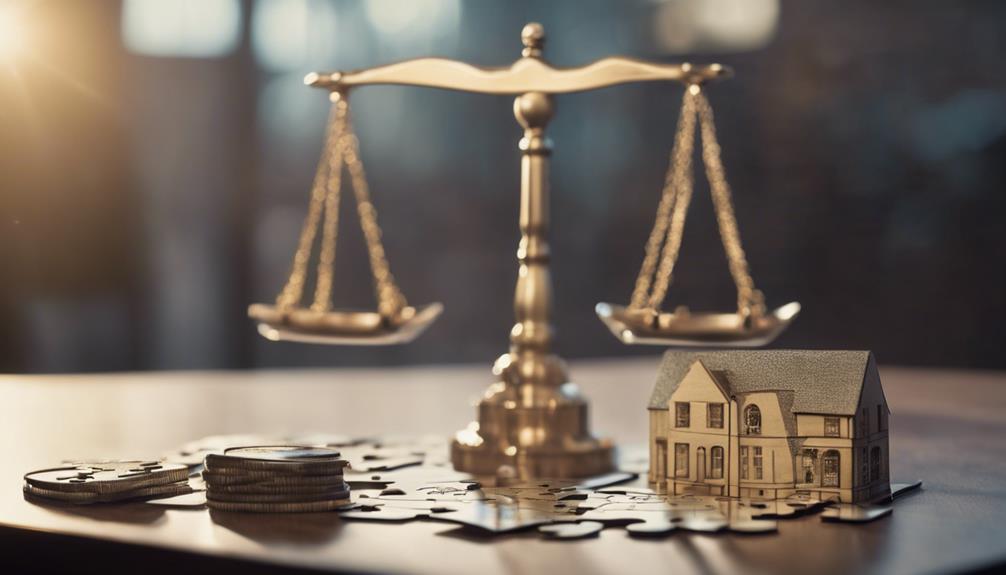
By meticulously evaluating the marital estate, celebrity couples can guarantee a fair asset division that takes into account the complexities of their financial holdings. To achieve this, couples often enlist the help of specialized financial experts who can assist in appraising complex assets and ensuring an equitable division.
The process of determining a fair asset division involves a detailed analysis of all financial holdings, including stocks, retirement accounts, and intellectual property rights. Additionally, the duration of the marriage, as well as the presence of a prenuptial agreement, can play a significant role in defining asset division terms.
Some key considerations in ensuring a fair asset division include:
- Accurate asset valuation, which involves determining the fair market value of assets such as real estate, investments, and businesses.
- Evaluating the future earning potential of each spouse, as well as their lifestyle maintenance requirements.
- Identifying and valuing unique assets, such as intellectual property rights or business interests.
Frequently Asked Questions
How Much Did Steven Spielberg Pay His Ex-Wife?
Steven Spielberg paid his ex-wife Amy Irving a $100 million settlement in their divorce, finalized in 1989. This significant amount was agreed upon despite the absence of a prenuptial agreement.
Surprisingly, Irving reportedly rejected a $100,000 settlement check from Spielberg's attorney during divorce proceedings, ultimately securing a much larger payout.
Who Suffers Most in Divorce Financially?
Women typically bear the brunt of financial hardship in divorce, with studies revealing a 20-30% decline in income post-divorce compared to men. This financial vulnerability is further exacerbated by the gender pay gap and societal norms around caregiving responsibilities.
In fact, research indicates that women's wealth decreases by 41% after a divorce, making them more likely to suffer financially in the long run.
Which Celebrity Pays the Most Alimony?
Dr. Dre pays one of the highest alimony amounts, agreeing to $100 million to Nicole Young in their settlement.
However, Michael Jordan takes the top spot, paying a staggering $168 million to Juanita Jordan, marking one of the most substantial settlements in celebrity divorce history.
These figures demonstrate the significant financial commitments involved in high-profile divorces, often influenced by factors like length of marriage and assets involved.
What Is the Largest Alimony Settlement Ever Recorded?
Like a financial tidal wave, the largest alimony settlement ever recorded crashed into the books when Sue Ann Hamm received a staggering $974.8 million from her divorce with Harold Hamm.
This monumental payout serves as a benchmark for alimony settlements, demonstrating the significant financial support owed to the spouse with lower earning capacity after divorce.
Conclusion
To sum up, maneuvering through the complexities of celebrity divorces requires a deep understanding of financial negotiations and asset division.
Take the example of Amazon founder Jeff Bezos' divorce from MacKenzie Bezos, where a staggering $38.3 billion in assets were divided.
As reported by Forbes, MacKenzie walked away with a 4% stake in Amazon, valuing her shares at approximately $38 billion.
This high-profile divorce settlement highlights the importance of strategic financial planning and expert negotiation in high-net-worth divorces.

